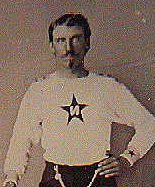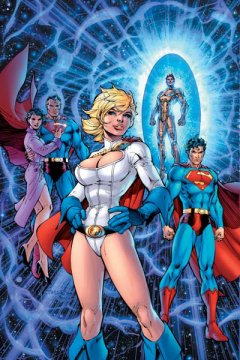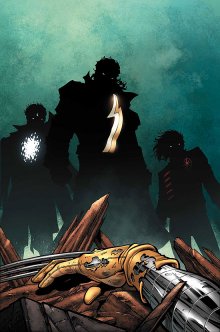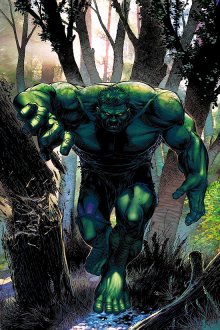|
|
|
|
Jason
Schachat remembers you.
|
Jason
Schachat's Occasional Breakdown
11/15/05
He's
back! We're not sure where he's been, but...let's get his
opinions anyway...
All
right kids, let’s try a little experiment: take a
snarky, prematurely-curmudgeonous comic critic and prevent
him from reading comics for, oh, half a year. Then throw
him back in the mix without ANY clue of the continuity he
missed out on, and see what you get!
Okay,
okay; that’s not exactly true. I REALLY tried to catch
up on all the books leading up to Infinite Crisis.
I read the first issue, and now, you’d think, I’d
be all caught up and able to clearly and concisely review
Issue #2 of the multiversal crossover extravaganza.
Ohhhhhh… how wrong you’d be…
Infinite
Crisis #2 begins by tossing us into all sorts
of little vignettes a la Crisis on Infinite Earths,
but doesn’t tie it together with the grand (not to
mention melodramatic and often laughable) narrative passages
showing WHAT THE HECK IS GOING ON.
If you’ve
kept up on the five gazillion storylines leading into this,
you know that the villains have united into an all-powerful
Society *cue spooky music*, the forces of magic and wizardry
are all outta whack, Batman’s computer has gone mustang
and created an army of unkillable cyborgs, it’s public
knowledge that Wonder Woman killed a man in cold blood,
Superman’s more useless than ever, and an interstellar
war with giant swirly vortexes of doom threatens to do something
really, really interesting. Eventually.
|
|
|
She
would kill you for debating her nipples.
|
But
this installment in the mega non-multiversal crossover event
sheds some light on things by expanding the subplot involving
the survivors of the Pre-Crisis multiverse (Crisis on
Infinite Earths, that is, not Identity Crisis,
Infinite Crisis, or other cheap attempts to boost sales
through the clever use of the word "crisis").
Apparently,
Superman, Superboy, Lois Lane, and Alexander Luthor (from...
you know, I'm not even going to try) have been watching
the DC Universe from the comfort of their own little "bubble"
dimension, but they don't like what they see. Too many Robins
dying, too many loony Green Lanterns, too many minds being
altered, too many inconsistent origin stories; enough is
enough! They'll have to do something...
Which is not to say that they had any hand
in all the bad mojo that kicked off the Crisis... 'cause
that would be silly... bubble dimension and all... you know...
So, even though much of the story is still
a big "huh?", Geoff Johns finally gets across
his mission statement: DC continuity is F'd up, the stories
are way too dark, and I'm not gonna take it any more!
Not
that the work he did on JSA, Flash, or Green
Lantern really demonstrates laziness in the face of
wacky continuity, but okay Geoff, we're with ya!
What we may not be with is the small library
you have to read to understand this thing. You REALLY need
to be well-versed in your DC continuity to avoid the head
scratches this story prompts, and, even then, the references
are not necessarily satisfying. Then Phil Jimenez gets a
little lazy with certain panels while others are dripping
with detail (the most challenging sights of all being the
cleavage shots of Power Girl which confirm once and for
all that she has no nipples).
What
DOES work is Johns' use of a big crossover to say "Can't
superheroes be superheroes again?" Unfortunately, he
sort of said the same thing in Green Lantern: Rebirth,
and the new Green Lantern has yet to demonstrate
that it's such a good idea.
An interesting
read, if you've already been used and abused by DC continuity,
but not one for newbies and certainly something with a lot
to prove.
|
|
|
Is
that Nightmask? Holy crap.
|
Now,
Exiles #72 is not a book I have
been reading the Cliffs Notes for. Most of "House of
M" slipped by me, and I really haven't the foggiest
idea what's supposed to be happening in the Marvel multiverse.
So why is it I feel so much more at home there?
Following
the Exiles finally taking control of their fates, the team
tangled with House of M, lost Beak, and are in the process
of losing Mimic to an alternate version of Proteus (who
figures the combination of his reality-altering powers and
the superpowers strewn across the multiverse are a scrum-diddily-umptious
recipe for godhood). Proteus rides Mimic's stolen body to
a universe where there are no mutants or hero teams running
around, but, as it turns out, a superbeing has recently
empowered people all across the globe with strange new abilities.
Abilities which Proteus can't wait to sample.
Why,
one might even call this a New Universe.
Now,
this is not a simpler landscape than what we're dealing
with in Infinite Crisis. Lots of information to
absorb, but far easier to assimilate. But, whereas the DC
crossover has the luxury of building up to a finale (whenever
they fix the multiverse problem... again), Exiles
is a constant struggle to patch the holes created by What
If...?, Age of Apocalypse, and other Marvel alternate
realities that we simply can't resist mixing with Marvel
Universe continuity (Maestro vs. Hulk. Again and again and
again. 'nuff said.)
In fact,
my only real complaint about this book would be Proteus'
rambling narration in which author Tony Bedard very capably
demonstrates how to butcher a Scottish accent.
As for
the longterm changes in Exiles, it's good to see
that, six years later, the feel of the team has changed
from the loose collection of wandering do-gooders to the
masters of multiversal heroism, yet it's still the same
book Judd Winick nursed beyond Age of Apocalypse
all those years ago.
While
I usually don't like the weird continuity Marvel encourages,
this book may be one of the great examples of the difference
between DC and Marvel: DC keeps mucking up their continuity
and restarting their multiverse every few years; Marvel
revels in its mistakes and makes a long-running series out
of it. If you want to follow a multiverse where realities
are happily altered every month and diversity is the name
of the game, Exiles is still the book for you.
And
remember to treasure a comic when it's doing you right,
because I took a break from Incredible Hulk
and Issue #88 has me beating myself up about it. Is it a
climactic ending to a story that's been building up? No,
not at all; new storyline with a new writer. Meaning no
more Peter David for a while.
God
just killed a kitten.
Seriously, though; the man is just such
a great Hulk writer that I had to overdose on his classic
run when he started writing the book again. His understanding
of the character is just that good.
This
new story? Simple and linear. Bruce Banner's living in the
woods, being alone. He reluctantly agrees to go to a party
in town, some girl nearly gets raped, HULK SMASH, the end.
Oh, but then we get a stinger where Nick Fury calls him
on a cell phone, and you remember that this is part one
of "Peace in our Time."
My problem here: The words "part one"
usually imply an inciting incident, the beginning of a story,
setting the players in motion, and catching us up on current
events. Writer Daniel Way just dumps a HULK SMASH on us
and calls it a day. No lesson learned, no character developed,
no plot movement. Nothing.
And you know what the sad thing is? I think
back to Peter David's first issue on his recent run, and
I can still remember it with crystal clarity. Hulk walking
across the bottom of the ocean, remembering Bruce Banner's
school years and the struggle between man and monster even
then. It didn't even matter when the last pages of the issue
swung off in a different direction; David hooked us. He
connected us to Hulk and Banner like they were in our own
heads. He kicked off a new storyline with gusto and made
us want to dive headlong into the series.
This
issue, on the other hand, is just sad. It goes absolutely
nowhere and doesn't even have fun doing it. Very sloppy
work and not a good start for a new story.
|









